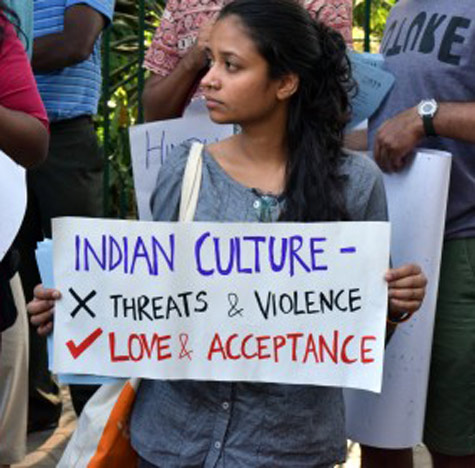The Siddaramaiah government in Karnataka plans to adopt 'Gandhigiri' to sensitise the youth and the 'patriarchal' society on moral policing, even as the police will continue to be responsible for apprehending those resorting to such practice.
 Representative image | Reuters
Representative image | Reuters
“Gender equality, secularism and plurality are the hallmark of Kannada culture, guaranteed by our Constitution too. We felt the need to treat it (moral policing) as a socio-cultural problem rather than a law and order issue. We see open violations (of individual freedom) in the country today,” says Baragur Ramachandrappa, chairman of the six-member committee which was entrusted with chalking down a state cultural policy, which if implemented, will be a first in the country.
A closer look at the recommendations made by the panel in the soon-to-be implemented cultural policy of Karnataka, tells you that it is a counter to the competitive moral policing in the coastal districts of the state. The policy will come into effect once it gets the cabinet approval.
“The idea is to form communal harmony committees to run programmes to educate youngsters and the society to abstain from taking law into their own hands. It is important to understand that moral policing is anti-constitutional, and as it targets women, it is time to tackle patriarchal mindsets. Besides the law, the government should be pro-active in sending out a strong message that such behaviour is not acceptable,” explains Ramachandrappa, adding that a set of 44 recommendations was submitted to the government in 2014 and it was only in last December that the government decided to implement them.
Weary of the culture of banning books, cinema and works of art, the panel has sought that any controversial piece of art be referred to an expert committee instead of the state government unilaterally deciding to ban the work. Recalling past instances when the state government had banned books (Valmiki, Aanu Deva and Dharmakaarana), Ramachandrappa, who is also a writer, said “Freedom of expression is crucial to democracy and to preserve our cultural ethos. However, we cannot support the works which hurt people’s sentiments or propagate extremism.”
To promote pluralism, the panel has mooted a tribal university, a research institute for Sufism and to study two ancient languages—Pali and Prakrut, which have enormous literature on Jainism and Buddhism.
Amid the ongoing controversy over the three-language policy in Metro train, the demand for Kannada flag, job reservations for Kannadigas and the aggressive campaign by the Karnataka Development Authority to popularise Kannada and its diktat to non-Kannadiga bank employees to either pick up conversing in Kannada or quit their jobs, the primacy of Kannada language seems to a favourite election plank of the the ruling Congress ahead of the 2018 assembly polls, as the chief minister is hoping to garner goodwill of the youth and the locals over the Kannada identity. On its part, the panel too has suggested giving “preference” to Kannada in all spheres. It has mooted a separate autonomous research institute for Kannada.
“After Kannada got the classical language tag, nothing much has changed. We want the State government to urge the Centre for a separate institute (now under CIIL, Mysore) on the lines of Tamil Nadu. We have also mooted decentralisation of Kannada and Culture department as creation of four separate divisions will help focus on regional cultures, folk, theatre and literature. The tourist places can have events that give a local flavour,” elaborates Ramachandrappa.




